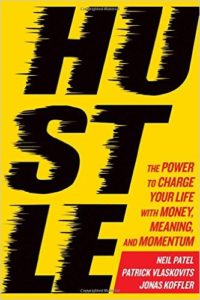First point of business: your questions…
I opened up my virtual mailbox today for another Mailbox Mondays issue, and a cricket jumped out!
This is an oddity, as ever since I started Breakthrough Marketing Secrets I’ve had an almost endless stream of reader questions.
So, let me ask you directly: what’s your single-biggest question or challenge I can take on now? Make it about marketing, copywriting, business, selling, life, whatever.
First one in gets covered next week. The rest get added to the queue, and answered soon.
Submit your question by email to [email protected].
Now on to today’s topic…
Why did you choose your current path?
I’ve been continuing to read Hustle: The Power to Charge Your Life with Money, Meaning, and Momentum by Neil Patel, Patrick Vlaskovits, and Jonas Koffler…
And it’s good!
The title of this book isn’t fair. And I think the authors know it. I’m pretty sure they chose it because “hustle” and “grit” are such trendy words today. But if you think this book is just about hustle, you’re short-changing it by a ton.
It’s about quite a few things. Thinking big. And doing big. Keeping yourself focused on the right work, not just working hard.
Productivity, yes. Self-improvement, yes. Motivation, yes.
But there’s another X-factor in it that’s not so prevalent in a lot of other books on the topic.
I remember this being hinted somewhere when I was making the decision to read it, and I’m glad I did because I might have skipped it otherwise.
Today’s thought, for me, is more of a reflection that came to mind when I was reading it, than a lesson taught directly in the book…
The fallacy of “paper chasing…”
I’ve been thinking a lot recently about what moves me. What do I get up excited to do? And what do I have to drag myself into doing, simply because it’s an obligation I’ve created for myself?
If I wake up excited to do a specific tasks, productivity and time management are almost irrelevant. I just get things done.
If, on the other hand, I’ve created an obligation for myself and now I just need to knock it out, I’m constantly struggling with productivity systems and time management hacks to force myself into it.
Seems like the ultimate productivity secret then is to do more of the things that intrinsically motivate me. And less of those that drag me down.
On the surface, this seems really obvious. But I think in implementation, in day-to-day life, we don’t implement this like we know we should.
I’ve talked to so many early-career copywriters who just want to know where the money is. And that’s important, on one level. Because you can easily end up excited about a topic or market that simply doesn’t have the cash to pay the kind of money you want to make (for me this happened in the self-help market — and even more so with my dad’s hobby of model airplanes).
But if you are attracted to an opportunity simply because someone told you it’s where you can make fat stacks of dough, you’re going to burn out.
The sweet spot then is to find out what you can do for customers or clients that contributes enough value that the money they’re willing to pay you can more than support your income needs and goals.
And the more naturally motivated and purpose-driven you are to pursue that avenue, the better it will be in the long run.
This is why one of the best things you can do is step back and take perspective…
Often when you start work with a coach or mentor, they’ll tell you that you need to take stock of your life.
You’re there, in your business, just trying to get things done. But they tell you that you need to stop working for a bit, and think. Think about where you are. How you got there. Where you were going. Where you want to go now. And most importantly, where you ultimately hope to end up — both in terms of your personal life, and the impact you want to make on the world.
What most people find when they really look at it is they ended up in their current job, occupation, business, or career (also, relationships) for some wrong reasons. And the more they keep pursuing that for all the wrong reasons, they less happy they are.
Fixing the root of the problem can make all the symptoms go away.
It’s not always a quick process, and it’s almost never easy, once you’ve wandered very far down your current path. But in the end, the rewards make it more than worth it.
Yours for bigger breakthroughs,
Roy Furr




